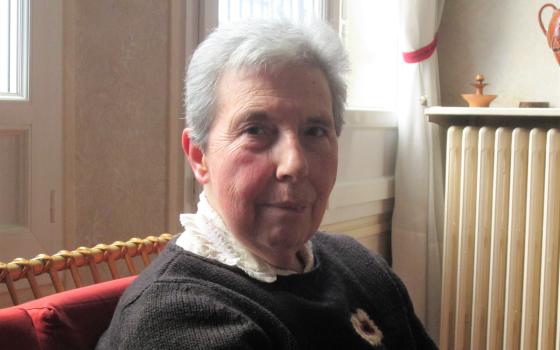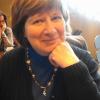After she earned her chemistry degree from the University of Bilbao in the Basque region of Spain, Sr. Begoña Iñarra decided to leave her native country and go to Africa to teach. She had read Pope Paul VI's encyclical Populorum Progressio, published a year earlier in 1967, that called for a world economy geared toward the development of all the people in the world and gave a new look to the Catholic Church's social teachings.
After three years in Congo, she decided to stay and joined the Missionary Sisters of Our Lady of Africa, also known as the White Sisters.
"I wanted to stay on and share what I had received," she said.
A map of the world is needed to follow her itinerary: She did her novitiate in what was then Congo, became Zaïre and is now the Democratic Republic of Congo. She moved on to Uganda during Idi Amin's regime, then lived in Ethiopia at the border with Eritrea, another war zone. She spent some time in Europe, then in Mozambique, where civil war would end a few months after her arrival.
She then studied trauma psychology in Canada for three years, then was a lobbyist at the European Union in Brussels. More recently, she spent a few years in Kenya. She is now in Paris, working with Aux Captifs, la Libération, an organization helping women get out of prostitution. Iñarra is a member of RENATE, Religious in Europe Networking Against Trafficking and Exploitation.
GSR: Why did you choose to become a White Sister?
Iñarra: The task of the Missionary Sisters of Our Lady of Africa is primarily to help improve women's lives. I was attracted to Africa and took a job as a science teacher in a Catholic school in a small town in Congo where the population was very mixed, Christians and Muslims. My students were boys, often older than me! Some had not attended school because of [instability in the region]. They wanted to catch up, even though some of them were in their late 20s. It certainly helped me know and understand Muslims.
In line with Vatican II, which ended a dozen years earlier, Msgr. Henri Teissier, bishop of Algiers, had said we were forbidden to baptize Muslims. It would be a mortal sin, he said, knowing Muslims could never accept this. Our mission was to live together in peace.
I still have some very good friends who are Muslim. This was never a problem.
We sisters could get in touch with Muslim women and be closer to their communities than a man could. The Missionary Sisters of Our Lady of Africa has always had a lot of power and autonomy.
In Ethiopia, the bishop asked us to found a community and learn the language, especially the liturgical language. Ethiopia has one of the oldest Christian communities, dating from the fourth century. The bishop wanted us to get acquainted to these old rites, to save them from being forgotten. He also insisted on the role of women, who could reach out to families, women and children, something priests could not do.
Most of our work in Africa is teaching, often simply to read and write.
Altogether, you spent more than 20 years in Africa. When you see the increasing number of Africans trying to come to Europe now, and when you see how many women end up victims of human trafficking, what do you think?
Poor people have always left their countries in search of a better future. But the Africans who leave now are not the poorest. They have to have some money to pay the traffickers who organize the migrations. They have to be able to borrow money. It is an irony that the more a country is developed, the more people emigrate.
Young women who come to Europe believe in a dream, the dream of a good job in a rich country. Life is very hard in a lot of African countries, especially for women. Through the internet, movies and television, they see a very different reality, an image of Europe that is not real. They see that women have more freedom in Europe, and nobody believes there is also a lot of poverty.
Everybody wants to hold on to their dream. Yesterday, I saw in the street here in Paris two African boys posing for a photograph in front of a luxurious car. I asked them in their language if they were going to send the picture home.
"Of course!" they replied.
I doubt they could afford such a car. But they have to keep the dream alive. When someone goes back to Africa for a wedding or a funeral, he has to bring expensive presents and tell his family and friends what a wonderful life he enjoys over there. Often, these travelers have to take out a loan to be able to buy these presents.
No surprise that women want to live their dreams, leave their country and never come back. Human traffickers see there an opportunity to make a lot of money. They encourage the women to leave, promise to take them to Europe. For this, they have to pay an enormous amount of money: 50,000 to 90,000 euros.
Do the women and their families know they might end up as prostitutes or domestic slaves?
Yes and no. There is a strong omerta. Nobody says anything, but a lot of people know. But it is a reality people prefer not to talk about. Governments are happy with the money workers can send to their families. Fighting human trafficking is not high on their agenda. They have more pressing problems, and since the majority of the victims are women, the situation doesn't attract much attention. These young women often leave small children behind even knowing they probably won't ever come back.
My congregation organizes meetings to explain the reality of life in Europe and warn young women about the risks of believing a relative, a neighbor or even a pastor who promises them their dream will come true but could be a trafficker.
Is it more important to tell people who want to emigrate that it is a very risky choice, or should measures be taken in Europe?
Actions should be taken in both places and at different levels. Governments, both in Europe and in African countries from where most of the women come, have to make the fight against human trafficking a priority. This is not the case right now. There should be laws, because laws are needed to change things, and money to implement these laws and help victims. Victims have been traumatized. They need time to recover. Governments seem to focus more on dismantling the networks of traffickers and tend to forget to help victims.
In France, there is no current government program to fight human trafficking. It is definitely not a priority. We have to lobby more to raise awareness. France is now debating ethical laws, discussing test-tube babies, surrogate motherhood, and there is no mention of human trafficking, sexual exploitation and domestic slavery, as if it did not exist in this country! What is their conception of a human being? RENATE is trying to put more pressure on governments. What is done is not enough. Prostitution should end.
Does the Catholic Church play a big part in this fight?
The Secours Catholique — Caritas France — has set up a committee, "Together against human trafficking," that gathers 28 different organizations, including two women religious congregations and some Protestant groups. Some help women apply for political asylum. Others find them temporary accommodation or legal counsel. Some go to schools to talk about prostitution to teenagers.
I, myself, go on tours in the Bois de Vincennes [on the outskirts of Paris] at night once a week. We park our truck and try to establish contact with the prostitutes. We offer them coffee and cookies, listen to them when they want to talk, give them information on their rights should they decide to leave this job. A medical doctor, a woman, always the same one, comes along and can see them and answer their questions. We know some of these prostitutes, and they know us. They are only paid 20 euros by their clients.
Unfortunately, human trafficking is not seen as very important by a lot of people, even in the Catholic Church. Is it because women do not count as much as men in the church? We have a long way to go to have human dignity recognized.
[Elisabeth Auvillain is a freelance journalist based in Paris.]

